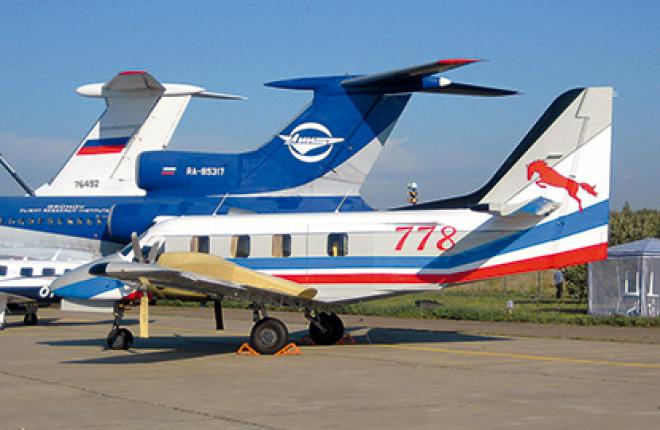Rysachok enters certification tests

Samara-based TsSKB-Progress is displaying two examples of the Technoavia Rysachok light twin turboprop at MAKS 2013. One of the aircraft is taking part in the flying displays, the other is in the static park.
The Rysachok program was launched in 2007 at the request of Ulyanovsk Higher School of Civil Aviation. The aircraft was originally intended as a trainer for flying schools. However, the customer amended the specifications at some point while the contractor failed to meet the agreed deadlines. The Ulyanovsk school effectively severed the contract with Technoavia in May 2012. Initially meant to seat nine to 10 passengers, the developer eventually decided to design two Kysachok variants, with 16 and 19 seats.
The aircraft is powered by a pair of Walter М601F turboprop engines. Technoavia in March 2011 contracted Walter’s US-based parent company GE Aviation to supply H80 engines in the upgraded M601 version for 30 aircraft, with an option for 30 more sets.
The flying phase of Rysachok’s certification program began earlier this year and will take around 1.5 years to complete.
The TsSKB-Progress assembly line will be certified concurrently, in the run-up to the launch of series production. Certain interest from regional carriers is expected.
Ссылки по теме
- Для того, чтобы оставить комментарий, не привязанный к социальной сети, войдите или зарегистрируйтесь на нашем сайте.
CIS & Russian Aviation News And Insights
- S7 Airlines reports passenger dip but sees business class surge in 2025
- Aeroflot maintains traffic and market share in 2025
- Domestic strength offsets international slide in LCC Pobeda’s 2025 results
- Rossiya Airlines sees overall passenger growth in 2025, international traffic declines
- Foreign airlines poised for Russian domestic market access in 2026, says Transport Ministry
- Russia gains second major provider for CFM56 MRO services
- Belavia’s traffic rises 8.4% in 2025, still half-way from precrisis peak
- Russia’s passenger traffic declines for first time since sanctions hit
- Russified MC-21 to achieve target range by 2029 only









